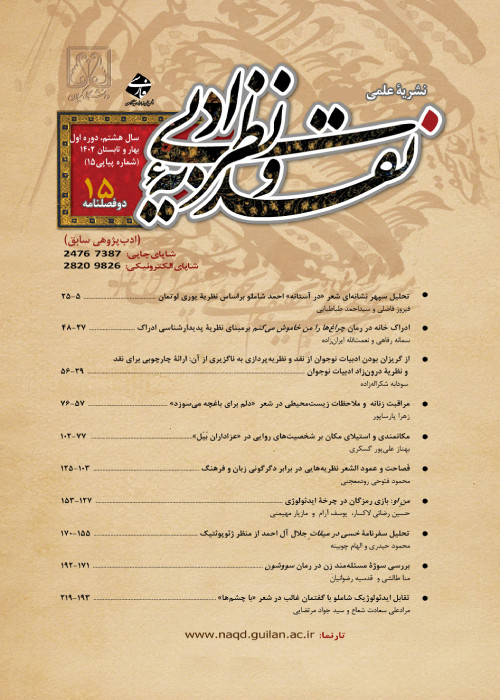The Teleology of Textual Criticism
In the past one hundred years, as textual criticism has become more common in Iran, we have witnessed an increase in the number of textual criticisms of classical works. These editions, except in some cases, are generally a kind of imitation and methodological duplication of the work done by renowned scholars in the field, and do not move beyond the virtual structure of the text in question. One of the main challenges of textual criticism in contemporary Iran is the disregard for the theoretical fundamentals of this field. Underdeveloped theoretical foundations, in most cases, have reduced the edition of Persian texts to a simple and mechanical countermeasure. Considering the necessity of theoretical discourse in the field of textual criticism, this paper tries to explore, explain and critique the teleology of textual criticism in various traditional, modern and postmodern views. Moreover, the relationship between reader comprehension and textual criticism has been criticized as one of the forgotten principles in the theoretical areas of correction.
Textual criticism has been defined variedly in different eras and civilizations. The kinds of texts, ideologies, worldviews, social structures and scientific movements in different periods of human civilization have resulted in the development of different methods of textual criticism. These methods have been based on users’ understanding, which has been in turn affected by the goals pursued in textual criticism. At least three kinds of teleological viewpoints, developed in classical, modern and postmodern eras, can be traced in textual criticism. In the classical era, the text is considered to be sacred, while in the modern era it is desecrated and examined within the framework of a scientific process. By going beyond textuality, postmodernism seeks to identify factors contributing to the production of the text, no longer finding it to be exclusively formed by the author.
In the past two centuries, European scholars have tried to replace traditional methods of textual criticism with modern ones. Textual criticism has a thousand-year-old history in the Islamic civilization. In the contemporary era, although many valuable Islamic works have been textually analyzed and emendated, Muslim scholars have been unwilling to join the theoretical discussions on textual criticism, such as the teleology of such an endeavor. Our understanding of the text and the methods we use to reconstruct old and modern texts are directly influenced by the telos followed in the textual analysis of texts. Teleology is the basis of theories of textual criticism and provides the theoretical framework for textual studies. Thus, engagement in such discussions, which have been predominantly overlooked in Iran, can pave the way for theoretical debates on the nature of textual criticism.
In the present study, first the traditional perfectionist attitude toward textual criticism, which is based on the Iranian culture in the Islamic era, is examined. Then, the bases of the modern experimental attitude will be discussed, and finally the pluralistic postmodern viewpoint will be studied. Also, the role of the audience in the teleology of the texts will be analyzed.
Traditional scholars have adopted a perfectionist outlook toward textual criticism as a tool for annotating and ornamenting texts. In the modern outlook, which has been influenced by scientific-experimental movements such as Darwinism, the text is regarded as a kind of evolution and attempt is made to trace the possible changes that the text has probably undergone so that its original form is revived. In the postmodern attitude toward textual criticism, a democratic approach is adopted and the text is considered to be the outcome of the contribution of different factors rather than being exclusively created by the author; thus, the postmodern critic tries to offer different accounts of the changes in the text, rather than reverse these changes.
Our conception of the text and its reconstruction is rooted in the telos resulting from the outlook taken by researchers and manifested through their taste and concerns. Audiences in different eras determine what objectives different texts and textual studies should pursue. However, not all audiences do exert the same influence; “superior audiences” develop new ends for researchers by attaching more importance to specific types of research. By refining their ideological and scientific beliefs, these audiences provide textual researchers with more reasonable ends.
- حق عضویت دریافتی صرف حمایت از نشریات عضو و نگهداری، تکمیل و توسعه مگیران میشود.
- پرداخت حق اشتراک و دانلود مقالات اجازه بازنشر آن در سایر رسانههای چاپی و دیجیتال را به کاربر نمیدهد.


